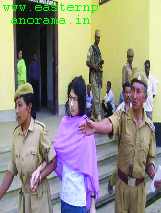Archives
Irom Chanu Sharmila
Irom Chanu Sharmila
- The Iron Lady of Manipur
For Irom Chanu Sharmila who has now become an iconic figure in India, getting arrested on charges of trying to take her own life by fasting, refusing bail and being released by the courts, have become routine.
bail and being released by the courts, have become routine.
Sharmila who has been released from custody off and on every year close to the International Women’s Day observation which falls on March 8, hopes that God - “even more powerful” than lawmakers in India - will someday see reason behind her silent crusade against the ‘draconian piece’ of legislation.
This young lady in her late thirties wants repeal of the Armed Forces Special Powers Act (AFSPA), 1958 which gives security forces sweeping powers to kill suspected rebels and immunity from prosecution. AFSPA was once amended in 1972 and was extended to the North East states besides being imposed in Jammu and Kashmir. This Act which was in force in Manipur since 1980 ostensibly gives troops the license to kill at will.
Known as the Iron Lady of Manipur, the iconic Sharmila has already had her rebirth as a revolutionary in 2000. On November 2 that year, soldiers of 8 Assam Rifles gunned down 10 civilians at Malom village near Manipur’s Tulihal airport.
The incident transformed Sharmila, one of many young human rights activists, into a woman of extraordinary grit. Her anti- AFSPA, 1958 fast unto death from that day on is now the stuff of legend in Manipur and beyond.
Thus three days after she began her strike, this youngest of the nine children of late Nanda and Shakhi of Kongpal Konkham Leikai in Imphal’s East district was arrested on the charge of attempting to commit suicide under section 309 of the Indian Penal Code.
 As she was force-fed through a nasal tube during her prison days in the past, she was shifted to the security wards of the newly established Jawaharlal Nehru Institute of Medical Sciences (JNIMS) at Porompat in Imphal.
As she was force-fed through a nasal tube during her prison days in the past, she was shifted to the security wards of the newly established Jawaharlal Nehru Institute of Medical Sciences (JNIMS) at Porompat in Imphal.
Thus she has been kept alive on the constant painful nasogastric intubation (filled with vitamins, minerals, laxatives, protein supplements and lentil soup) and in solitary confinement as a high security prisoner for almost ten years. As she refuses bail, she has been under judicial custody ever since. She was released from this custody from time to time as the prison term expires once a year. As a result the ritual of release and rearrest is still continuing.
In one such instance of her release from custody in March last year, Sharmila’s niece Irom Jeny who is a class IV student had said that the authority should fulfill her aunty’s demand so that they can all live together as they did earlier.
Ever since she launched her agitation, many political heavyweights of the country have tried to persuade her to give up her fast but she refused to entertain such thoughts.
After more than nine years in prison, she still sticks to her demand. “I will continue the campaign until the demand is met,” she reaffirms.
On November 20, 2004, even the Prime Minister of the country Dr Manmohan Singh had assured her that his government would review the Act.
As a result a review committee constituted by the government had already submitted its recommendation report a few years back. However she remained unmoved as the United Progressive Alliance Government at the Centre seems to have turned a deaf ear to her cries.
Meeting Sharmila, who is in custody, is not easy, even for her family. “We need permission from the state authority to see her,” Irom Shinghajit, Sharmila’s elder brother who went to Seoul in South Korea in 2007 to receive the coveted South Korean based May 18 Memorial Foundation sponsored Gwangzu Prize for Human Rights awarded to Sharmila said.
On September 11th this year, she had been conferred with the Rabindranath Tagore Peace Prize by the Indian Institute of Planning and Management (IIPM), New Delhi to honor her courageous and determined struggle for peace in Manipur.
Management (IIPM), New Delhi to honor her courageous and determined struggle for peace in Manipur.
“I am now demanding the removal of the Act” Sharmila said in a low voice while receiving the peace prize. “People especially women are suffering a great deal under the Act”.
IIPM’s founder Director and the Chairman of the award selection Committee, Dr Malay Chauduri along with the institute’s Registrar Ratna Chaudhuri personally visited her to confer upon her the prestigious award which includes a sum of Rs. 51 lakhs along with a Gold Medal and a citation.
The Rabindranath Tagore Memorial Prize was instituted as an International award in memory of Rabindranath Tagore on the occasion of the poet’s 150th birth anniversary in 2011 and is comparable to the Nobel Prize,
Malay Chaudhuri said, “Sharmila is one of the unique ladies of the country. We’re conferring the award for her determination and courage.”
Sharmila’s brother Singhajit who was also present during the handing over of the award said, “The award money would be utilized while conducting several programmes relating to her ongoing campaign.” The money from the award will be donated to the services of containing anti-social elements and helping the welfare activities of the people.
Singhajit is the managing trustee of Just Peace Foundation, a rights group supporting Sharmila’s cause which had been organizing a 100-day countdown to the completion of a decade-long fast by Irom Sharmila with a call for a united struggle against AFSPA.
Meira Paibis - the women torch bearers having one of the biggest grass-roots level organizations in the country who formed Sharmila Kanba Lup, a body to save Sharmila’s movement had even begun a relay hunger strike close to a place near JNIMS ward wherein Sharmila is being kept, from December 10, 2008 onwards.

